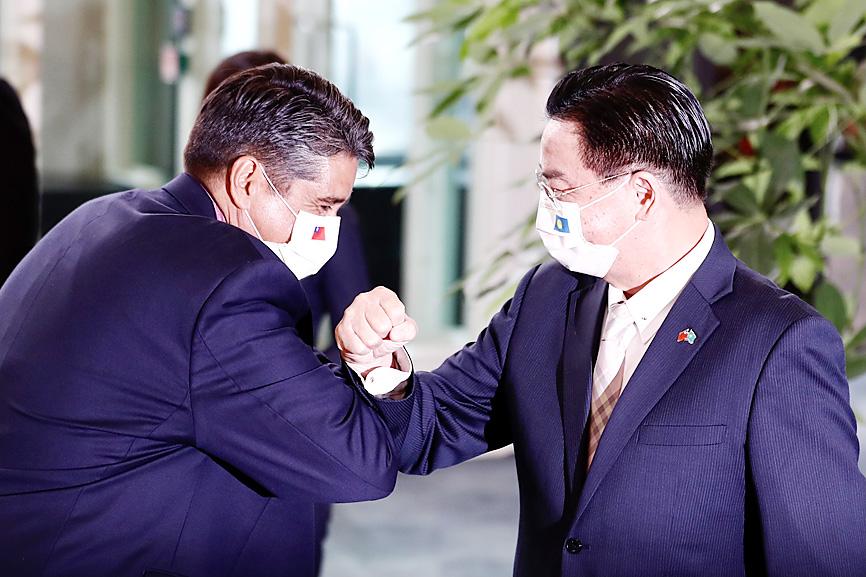Palauan President Surangel Whipps Jr arrived in Taiwan yesterday afternoon for a five-day visit to promote tourism to his country, becoming the first head of state to visit the nation since the COVID-19 pandemic began last year.
The visit also came as a COVID-19 “travel bubble” is to form between Taiwan and Palau, with the first tour group to depart from Taipei on Thursday.
Whipps and his delegation arrived at Taiwan Taoyuan International Airport at 3:50pm and were greeted by Minister of Foreign Affairs Joseph Wu (吳釗燮) at the boarding gate.

Photo: Ritchie B. Tongo, EPA-EFE
US Ambassador to Palau John Hennessey-Niland is a member of the delegation.
In a brief speech at the airport, Whipps said they are excited and ready to launch the “travel corridor,” or “sterile corridor,” between Palau and Taiwan — which he believes would be the first between a “COVID-19-free” and a “COVID-19-safe” country.
The link is only possible because of the incredible work that the Taiwanese government has done over the past year in containing the virus, keeping its people safe from COVID-19, he said, adding the Palauan Ministry of Health has also been diligent, and a Centers for Disease Control (CDC) team determined that Palau was truly COVID-19-free when it visited the country.
“We trust what Taiwan has done is an example of a successful country in combating COVID-19. We feel now that we can work together and feel safe,” he said. “We trust each other, and I think this is the basis of this sterile corridor.”
Whipps would travel with the first Taiwanese tour groups to visit Palau under the “travel bubble.”
Separately yesterday, asked about the disease prevention measures prepared for the Palauan delegation in Taiwan, CDC Deputy Director-General Chuang Jen-hsiang (莊人祥), who is the spokesman of the Central Epidemic Command Center (CECC), said the delegation provided negative polymerase chain reaction (PCR) test results from within three days of boarding their flight, so they did not need testing after landing.
Whipps and his delegation would use a separate door, elevator and dining area in the hotel where they are staying, and thermometers and alcohol-based hand sanitizers have been prepared for them, he added.
The CECC has also suggested that they wear masks at all times, practice social distancing, record all their close contacts, and avoid contact with local residents, he said, adding that their traffic routes have been planned out in advance and Ministry of Foreign Affairs staff would accompany them throughout the visit.
They would receive a PCR test before leaving Taiwan, Chuang added.
In related news, the CECC yesterday reported two imported cases of COVID-19, both Philippine migrant workers.
Additional reporting by Lu Yi-hsuan and Lin Hui-chin

NATIONAL SECURITY THREAT: An official said that Guan Guan’s comments had gone beyond the threshold of free speech, as she advocated for the destruction of the ROC China-born media influencer Guan Guan’s (關關) residency permit has been revoked for repeatedly posting pro-China content that threatens national security, the National Immigration Agency said yesterday. Guan Guan has said many controversial things in her videos posted to Douyin (抖音), including “the red flag will soon be painted all over Taiwan” and “Taiwan is an inseparable part of China,” while expressing hope for expedited “reunification.” The agency received multiple reports alleging that Guan Guan had advocated for armed reunification last year. After investigating, the agency last month issued a notice requiring her to appear and account for her actions. Guan Guan appeared as required,

A strong cold air mass is expected to arrive tonight, bringing a change in weather and a drop in temperature, the Central Weather Administration (CWA) said. The coldest time would be early on Thursday morning, with temperatures in some areas dipping as low as 8°C, it said. Daytime highs yesterday were 22°C to 24°C in northern and eastern Taiwan, and about 25°C to 28°C in the central and southern regions, it said. However, nighttime lows would dip to about 15°C to 16°C in central and northern Taiwan as well as the northeast, and 17°C to 19°C elsewhere, it said. Tropical Storm Nokaen, currently

PAPERS, PLEASE: The gang exploited the high value of the passports, selling them at inflated prices to Chinese buyers, who would treat them as ‘invisibility cloaks’ The Yilan District Court has handed four members of a syndicate prison terms ranging from one year and two months to two years and two months for their involvement in a scheme to purchase Taiwanese passports and resell them abroad at a massive markup. A Chinese human smuggling syndicate purchased Taiwanese passports through local criminal networks, exploiting the passports’ visa-free travel privileges to turn a profit of more than 20 times the original price, the court said. Such criminal organizations enable people to impersonate Taiwanese when entering and exiting Taiwan and other countries, undermining social order and the credibility of the nation’s

‘SALAMI-SLICING’: Beijing’s ‘gray zone’ tactics around the Pratas Islands have been slowly intensifying, with the PLA testing Taiwan’s responses and limits, an expert said The Ministry of National Defense yesterday condemned an intrusion by a Chinese drone into the airspace of the Pratas Islands (Dongsha Islands, 東沙群島) as a serious disruption of regional peace. The ministry said it detected the Chinese surveillance and reconnaissance drone entering the southwestern parts of Taiwan’s air defense identification zone early yesterday, and it approached the Pratas Islands at 5:41am. The ministry said it immediately notified the garrison stationed in the area to enhance aerial surveillance and alert levels, and the drone was detected in the islands’ territorial airspace at 5:44am, maintaining an altitude outside the effective range of air-defense weaponry. Following